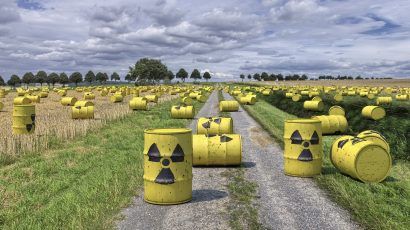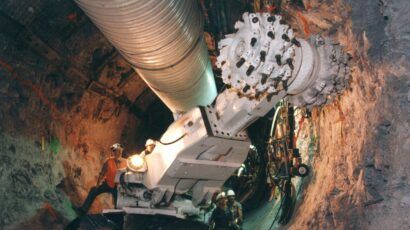Search results for trump
When DC and Sacramento bureaucrats fight over carbon dioxide
The EPA will likely weaken Obama-era fuel efficiency standards. California doesn’t have to care.
The case for going to war against climate change
Climate change is still treated as an ecological and humanitarian issue. Recognizing its security dimension allows the armed forces to jump-start climate action.
New information tool on nuclear weapons seeks to identify the next arms control strategies
Past arms control efforts failed to recognize the historical context in which new nuclear weapons capabilities were introduced. A new tool seeks to address that.
Why Iran may feel less restrained in nuclear decision-making now
The striking realignment of alliances and priorities in the Middle East and beyond could impact Iran’s nuclear decisions.
Six memorable climate change pieces from 2018
An entirely unscientific sampling.
A talk with the Bulletin’s new executive chair, Jerry Brown
An interview with California Gov. and new Bulletin Executive Chair Jerry Brown
Project Maven brings AI to the fight against ISIS
A crash Defense Department program designed to deliver AI technologies to a combat theater within six months is a smashing success so far. But is the Pentagon ready for the enormous challenges that lie at the intersection of military power and artificial intelligence?
To find a place to store spent nuclear fuel, Congress needs to stop trying to revive Yucca Mountain
A recent congressional hearing tried to relive the fantasy that the US government could somehow manage to build a nuclear waste repository at Yucca Mountain. It doesn’t have to.
Passion, by design
Renowned graphic designer Michael Bierut created much of the Bulletin’s current visual look and feel. He also created the near-perfect logo—the letter H with a horizontal arrow integrated and driving forward—for Hillary Clinton’s less-than-perfect 2016 presidential campaign. In a recent Design Observer piece, Bierut explains the equally surprising journey during which the Hillary 2016 logo went from panned to praised to past tense.
History seldom repeats itself but sometimes rhymes—with Crimea
Eerie premonitions of the Crimean crisis in the Bulletin's past coverage of Ukraine.
EPA should protect America’s children by further revisions of the Lead and Copper Rule
The Biden administration has announced plans to begin implementation of the updated form of the revised Lead and Copper Rule, which aims to protect Americans from lead contamination in water. Because the revised rule remains deeply flawed and dangerous to America’s children, the EPA should go back to the drawing board to drastically revamp it.
Ten of 2016’s most notable columns. And three books.
Great analysis and opinion from our regular contributors from the last year.
Sanctioning Russia’s oligarchs—with shame
The last few months have brought a different sanctions strategy to the fore: one aimed at stigmatizing the individuals close to Putin’s regime, in hopes of shattering elite support and encouraging revolt. These sanctions, which have led to freezing and seizures of Russian oligarchs’ assets in the West, have prompted the first murmurs of public dissent by Russian oligarchs in nearly two decades.
Radiation risks are real. But no cause for radiophobia.
A woman’s son broke his leg and had an X-ray. Three weeks later, she was still so afraid of radiation that she would not hug him.
The Khashoggi murder raises questions about a Saudi Bomb
In a story that migrated off the New York Times’ home page far too quickly, David Sanger and William Broad asked a searingly important question that has yet to seize the world imagination: Can Saudi Arabian leaders be trusted with the means to create nuclear weapons?
North Korea’s latest missile test
A game-changer? Or more of the same?
What Joe Biden can do to reduce racial health disparities: A conversation with Juliette Blount
Juliette Blount, a nurse practitioner, speaks to and consults with health care groups about racial health disparities and how biases can enter the medical exam room.
Beto O’Rourke: “Any plan to address climate change must address environmental justice”
The 2020 presidential candidate spells out a climate policy that pays serious attention to race, income, and class.
Beatrice Fihn explains why nuclear weapons are a scam
A year ago, a majority of the world’s countries—122 of them—voted to enact a treaty with the highly ambitious goal of abolishing nuclear weapons entirely. To the treaty’s critics, it wasn’t so much ambitious as foolish, counterproductive, or irrelevant. But proponents and critics alike can at least agree that it was unprecedented. While the community … Continued



















